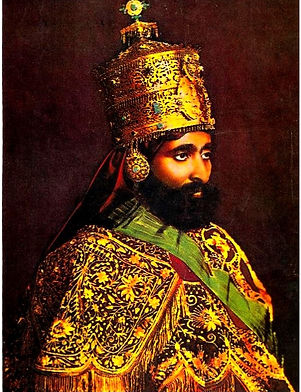Debre Ganet Kidus Gabriel
Ethiopian Orthodox Tewahedo Church, In N.J., Inc


His Imperial Majesty
Emperor Haile Selassie, The First
The Emperor writes in the Introduction of his Autobiography, "Whatever the task may be, men may begin, but he cannot complete it unless God sustains and supports him. Thus, we ourselves, by virtue of our descent from the Queen of Sheba and King Solomon, ever since we accepted in trust, in 1916, first the regency of the 'Ethiopian realm and later the Imperial Dignity, right up to the present, we have set out to the best of our ability through which our people may attain a higher level; hence our conscience does not rebuke us."
.... H.I.M. ....
When I myself took over this responsibility in 1916, it was necessary to correct the chaotic neglect of fully 6 years {by Lij Iyasu} and to make a beginning with the work not yet started, i.e., introducing the new civilization. I spent my time working, to the best of my ability, while my own ideas and the people fond of the old customs {particularly as the latter held many supporters}, squeezed me like wood between two pieces of iron.
There was very little time that i could spend in idle conversation and doing the things that give one pleasure. In addition to this, from time to time, we encountered some difficulties, internal as well as external which were spread about by natives or by foreigners and which constituted obstacles to our work of innovation. It was thus essential to carry out everything perfectly in order to prevent upheavals, bloodshed, and tribal divisions. I was aware, even before i took over the affairs of government that internal upheavals constituted a useful constitution to the designs of our enemies.
We were particularly convinced by the policies directed against us, that the enemy's heart was stricken with envy at our setting up a constitution to strengthen and to consolidate Ethiopia's unity, at our opening schools for boys and girls, at our building hospitals in which our people's health was to be safeguarded as well as of all sorts of other innovations of ours by which Ethiopia's independence would be affirmed, not only in terms of history, but in actual fact. for this reason, while we took great care to prevent any divisions among our people, we did not wish to take any coercive means that might appear oppressive to our people.
While we were engaged upon all this careful work and were beginning to lead our people on the road to civilization, our enemy rose up with violence sending to our country, many troops with modern equipment as well as numerous war-planes, and tanks, breaking the covenant of the nations and fighting us with machine-guns and artillery and with modern weapons many times superior in quality and quantity to our equipment. We addressed and appeal to the League of Nations and with our heart free of panic, we encouraged our armies. While we resisted firmly and defended ourselves, they poured all sorts of poison and smoke gases upon us which were capable of causing serious damage and which are prohibited by international law.
They dropped many bombs on us and even bombarded the International Red Cross doctors together with their medical equipment, thus preventing those injured by bombs and machine guns or suffocation with poison gas from receiving medical attention or care. We ourselves fought for our liberty in battles like any ordinary soldier and mustered the troops like any other officer. On account of our inability to obtain even a loan for the purchase of arms, we did not have any adequate equipment for defense - except for a few modern weapons. After we had resisted to the best of our ability with weapons 40 years old, we were defeated for the time being in no shameful manner.
-Bath, England, Written Yekatit 1929 {February 1937}
Haile Selassie, Emperor of Ethiopia
From The Introduction of H.I.M Autobiography
For two-thirds of his life all the problems Haile Selassie had to face arose from the fact that he was in advance of his time; and it was the tragedy of his reign that during the last third, the wind of change in Africa blew so fierce and so suddenly, that it swept away the good with the evil. It was said of him that he had dignity and pride in this hour of turmoil.
Like Moses in Deuteronomy 34, "no man knoweth of his sepulcher until this until this day" and "his eyes was not dim nor his natural force abated."
For close to 58 years Haile Selassie has been ruler of Ethiopia and for 44 years, her Emperor, the world's senior statesman; aloof and regal heir to a long tradition of Semitic exclusiveness, yet founder of the Organization of African Unity; approachable as well as withdrawn; imbued with profound mystique, small in physical statue, yet commanding in personality and a symbol of regal strength and enduring power.
During the life time of this Emperor, greater and more profound changes has occurred in Ethiopia than throughout the previous two and a half millennia of recorded Ethiopian history.
